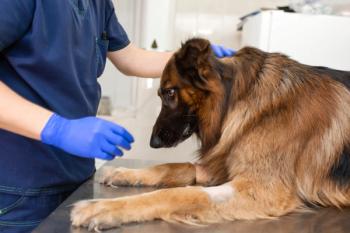
A veterinarian’s desire to help a staff member leads to a tough business lesson.
Dr. Marc Rosenberg is the director of the Voorhees Veterinary Center in Voorhees, New Jersey.Growing up in a veterinary family, he was inspired to join the profession because his father was a small animal practitioner. Dr. Rosenberg has two dogs and three cats.In Dr. Rosenbergs private time, he enjoys playing basketball and swing dancing with his wifethey have danced all over the world, including New York City, Paris and Tokyo. Dr. Rosenberg has been a member of the Screen Actors Guild and the American Federation of Television and Radio Actors for more than 30 years. He has hosted two radio shows, a national TV show and appeared in over 30 national TV commercials, all with pet care themes.

A veterinarian’s desire to help a staff member leads to a tough business lesson.

A diverse group of practitioners discusses experience, mentoring and implementing newer approaches.

An older practice owner weighs future options for his business.

Marc Rosenberg, VMD, presents a case of an employee referral that was not well received.

When a staff member receives a bite wound from a patient, this clinic assesses its existing safety procedures, plus determines how to approach and prevent similar future incidents.

A practice weighs its options for the best way to spend surplus income for the betterment of animal lives.

An environment that is respectful of employees and free of harassment may lead to increased job satisfaction.

A robbery is something you hope to never experience at your hospital, but being prepared is crucial for ensuring your staff's safety and preventing significant loss of cash, equipment, and more.

Find out how this animal hospital was able to mitigate unruly clients, reduce team stress, and boost client relations by enforcing a “don’t say no” policy.

With the world slowly beginning to reopen, should vaccination refusal be grounds for termination?

Should you assess your veterinary team’s performance before transitioning into a post-pandemic world?

How should veterinary clinics confront a blatantly racist client?

What would you do if one or more of your staff members refused to get the COVID-19 vaccine?

Regardless of the intention, it is never OK for a veterinary technician to sign off on a medical order on behalf of a veterinarian.

Who controls an animal’s care when its owners split up? Things can get nasty, and the veterinarian may be caught in the middle.

Should a team member be fired for one isolated incident of physical abuse toward a seemingly aggressive patient during these stressful, unprecedented times?

Offsetting COVID-19-related veterinary hospital expenses without turning off clients.

Do practice owners have the right to tell employees what and where they can eat while they’re on the clock?

The pros and cons of hiring relatives at your veterinary practice.

Does a veterinary practice have the right to force staff to follow COVID-19 safety protocols even when they are not working?

As pandemic restrictions ease should veterinary practices get to choose whether they stop or continue curbside care?

In a time of ongoing uncertainty, veterinary practices are trying to get used to new rules and regulations. But are these rules really one size fits all?

The dilemma: Should you give special recognition to your front-line veterinary practice team in light of the fact that others were unable to work during COVID-19?

Addressing this question with your elderly clients can be challenging and uncomfortable, but it’s important and requires careful attention.

Providing optimal care while respecting your veterinary clients’ financial limitations can be challenging, but can be done.

A general practitioner ends up in the hot seat when her municipality requires rabies vaccine boosters before the 3-year expiration date. Should she fight city hall to support her clients? Dr. Rosenberg weighs in.

Price breaks for staff family members, hardship clients and rescue organizations are costing Dr. Reed's veterinary practice. His brilliant idea? Staff members should pay a percentage of the discount. Hold on, says his hospital administrator.

Dealing with veterinary clients can be inspiring, exciting and also frustrating. Do you agree with this practice owner who told her staff members they need a thicker skin and more understanding when working with the pet-owning public?

How much is too much when asking about a troubled doctors personal problems? And what can a practice owner do to help? This what if? scenario uncovers big questions for veterinary professionals.

When a veterinary client asks a doctor to sign off on a therapy dog certificate, should he push back if he thinks its fraud?